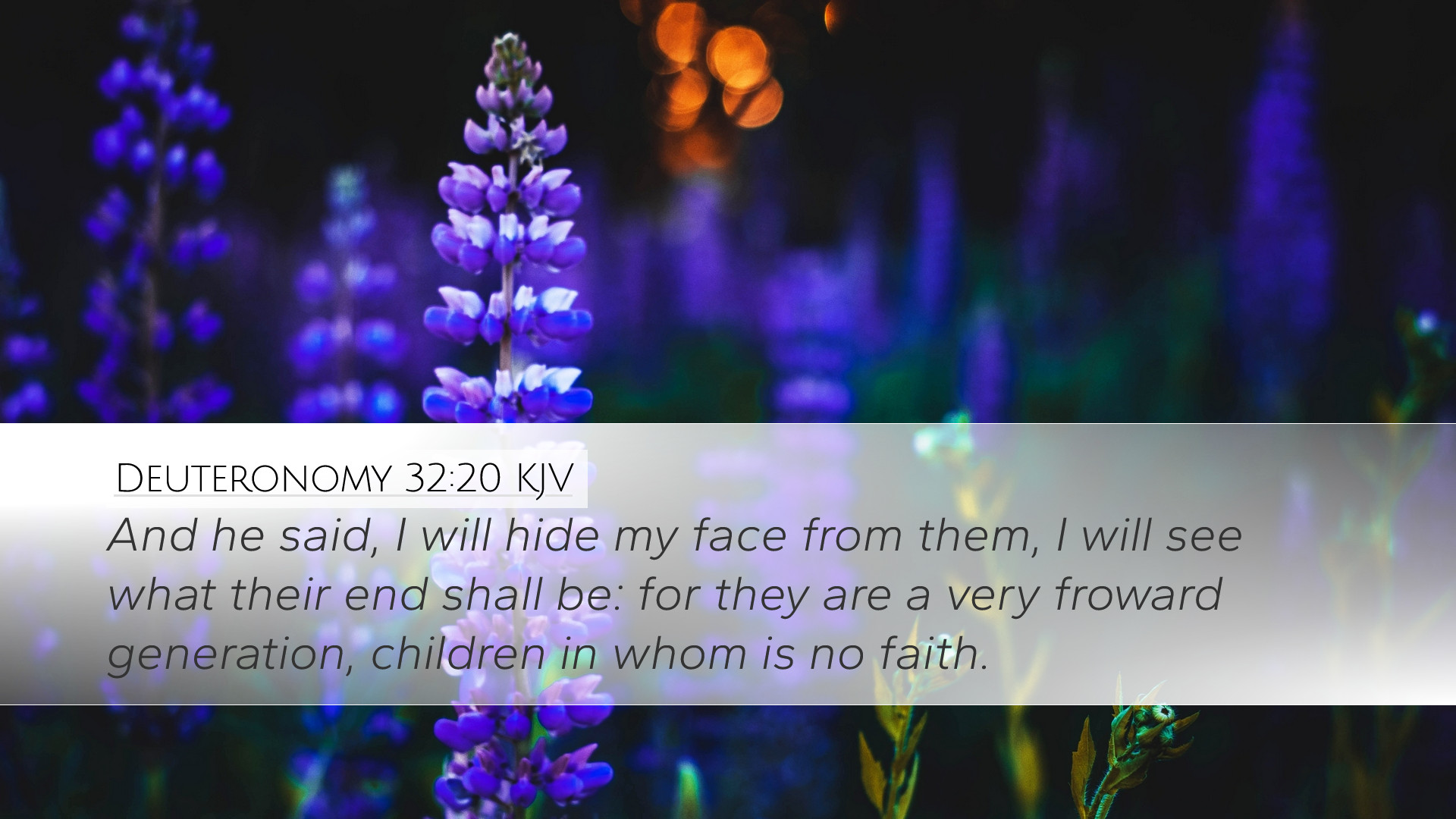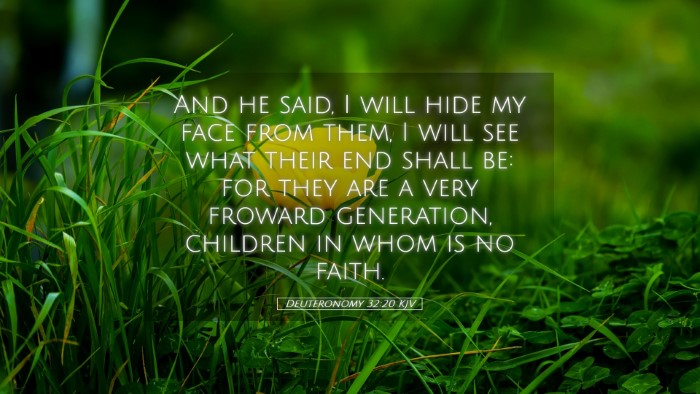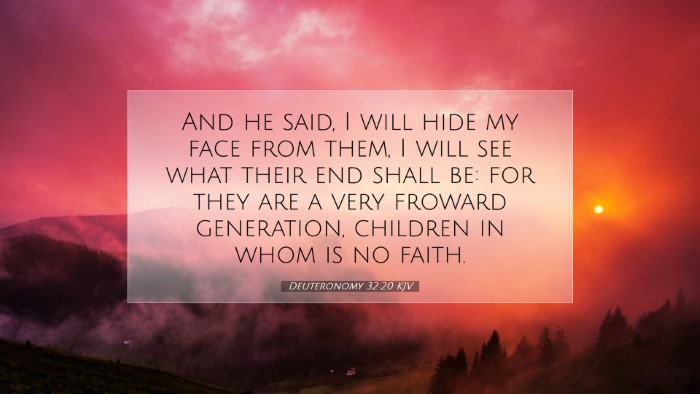Commentary on Deuteronomy 32:20
Verse: "And he said, I will hide my face from them, I will see what their end shall be: for they are a very froward generation, children in whom is no faith." (Deuteronomy 32:20, KJV)
Introduction
The poignant words of Deuteronomy 32:20 come from the Song of Moses, which highlights the relationship between God and His people Israel. This verse encapsulates God's response to the rebellious nature of the Israelites, indicating a moment of divine withdrawal and the consequences of their continued disobedience. The theological implications are profound, touching on themes of faith, judgment, and divine justice.
The Divine Character and Human Rebellion
Matthew Henry remarks on the profound sorrow expressed by God in this verse. The phrase "I will hide my face from them" signifies not only abandonment but also the resulting despair that accompanies a lack of divine presence. Henry emphasizes that this withdrawal is a direct response to the frowardness—rebellion and obstinacy—of the Israelites:
- Froward Generation: The term “froward” indicates a stubborn and rebellious nature, reflecting the spiritual condition of Israel. Henry notes that such a generation is known for its hardness of heart and resistance to God’s commands.
- No Faith: The declaration that they are "children in whom is no faith" underlines the gravity of their spiritual state. It suggests that their disobedience arises from a profound lack of trust in God’s goodness and promises.
The Consequences of Divine Withdrawal
Albert Barnes elucidates the consequences of God's hidden face and offers insights into the plight of a faithless people. He argues that God's withdrawal serves as a means to test the fidelity of His people:
- Testing God's People: God intentionally withholds His presence to observe the outcome of their actions and choices. This idea resonates throughout biblical history where God tests His people to mature their faith (James 1:2-4).
- Spiritual Desolation: Barnes adds that when God hides His face, it leads to a spiritual desolation that affects all aspects of life. Without the guiding presence of God, the people are left vulnerable to their circumstances.
Hope Amid Judgment
Adam Clarke provides a more hopeful lens, suggesting that this moment of hiding His face does not equate to a complete abandonment. Rather, it serves as a highlighted moment for reflection and potential repentance:
- Possibility of Restoration: Clarke notes that God's ultimate intention is not total estrangement but rather the opportunity for the human heart to turn back to Him. The absence of divine blessing might prompt the people to seek restoration.
- Divine Patience: Clarke’s understanding is that God's patience is evident even amidst judgment. Hiding His face serves as both discipline and a call for introspection, pushing Israel to acknowledge their sinfulness.
Theological Reflections
Through a theological lens, Deuteronomy 32:20 confronts believers with significant reflections:
- The Nature of God: The verse reveals God's holiness and the seriousness with which He regards disobedience. His justice demands a response to sin and rebellion. God cannot endorse wrongdoing, and His holy nature drives a wedge between Himself and those who refuse to follow His ways.
- The Role of Faith: The absence of faith is a recurring theme throughout scripture, and the lack of faith among the Israelites in this verse serves as a warning to all generations. Faith is foundational to the covenant relationship, and its absence leads to spiritual calamity.
- God’s Sovereignty: The action of hiding His face implies God's sovereign right to withdraw His blessing. It emphasizes His control over human history and the destiny of nations. This can both inspire fear and foster reverence, as believers recognize the authority of God.
Lessons for Modern Believers
The lessons gleaned from Deuteronomy 32:20 are particularly relevant for modern believers:
- Self-Examination: As Christians, there is a call to self-examination; are we a faithless generation? Engaging with God’s Word and pursuing faith are vital to maintaining a close relationship with the Lord.
- Faith in Trials: In seasons when one might feel that God has hidden His face, it becomes essential to cling to the truths of Scripture and hold onto faith. Just as Israel needed to turn back to God, so must we.
- The Call to Repentance: The themes of judgment and the possibility of repentance are timeless. Christians are called to continuously seek God in humility and strive for a relationship characterized by trust and faithfulness.
- Community and Accountability: The collective faith of the community is vital, suggesting the importance of building each other up in faith. Accountability within church communities can foster an environment that seeks God's face together.
Conclusion
In summary, Deuteronomy 32:20 provides a substantial theological teaching underscoring the importance of faith, the consequences of rebellion, and the nature of God's relationship with His people. The commentary from Henry, Barnes, and Clarke offers valuable insights, urging readers—both ancient and modern—to remain faithful and responsive to God's call, understanding that periods of divine silence may also be moments for spiritual growth and introspection.


